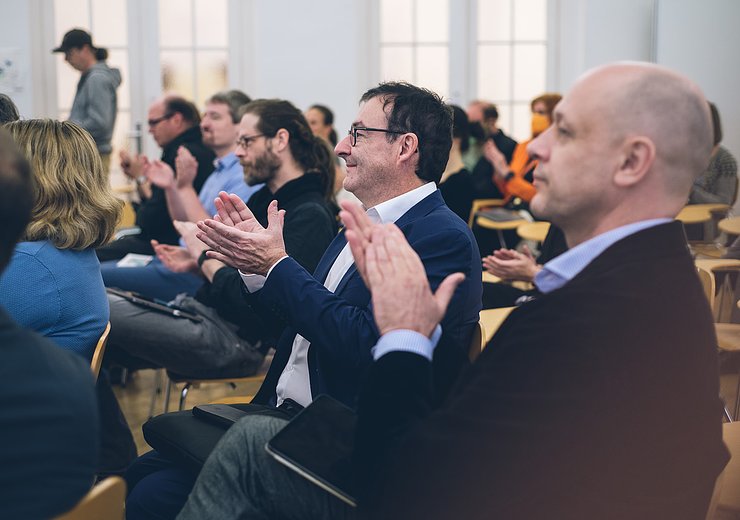Big Data, Big Picture
Celebrating five years of successful cooperation with Deutsche Telekom, Magenta, and TU Berlin within the Data Intelligence Lab.

On October 13, 2022, Deutsche Telekom and the Data Intelligence Lab at TU Wien Informatics had all the reason to celebrate: Since November 2017, the Data Intelligence Lab led by endowed professor Allan Hanbury has been committed to producing and analyzing meaningful data for society and can look back on five successful years of collaboration.
Together with partners from TU Berlin, Telekom’s T-Labs, and Magenta, researchers from the Data Intelligence Lab presented projects and results linked to logistics networks, defect detection in network infrastructure, as well as language processing and analytics in legal and patent contexts. Peter Puschner, member of the Dean’s Team and Associate Professor for Cyber-Physical Systems at TU Wien Informatics, thanked all parties involved for their collaborative effort: “The hard work of Allan Hanbury and the team and the funding of Deutsche Telekom not only produced significant research results visible around the world, but with these results, the team also provided a fundament for political decision making in challenging times.”
Riccardo Pascotto, VP & Head of Research Cooperation & Funding at T-Labs, congratulated the team, stating that “this cooperation is a foundation for going further. T-Labs aims to bring research into real life, with results related to crucial societal problems. We are thrilled that the work of the Data Intelligence Lab accomplished this and more.” TU Berlin has a longstanding strategic partnership with TU Wien and was part of the lab’s implementation from the beginning. Axel Küpper, Professor for Service-centric Networking at TU Berlin and T-Labs, is convinced that “there is a lot of room for thinking about new initiatives. To foster the change of ideas, researchers, and students with TU Wien Informatics, we are excited to further deepen our partnership in the future.”
The Data Intelligence Lab
The Data Intelligence Lab built a bridge between methods for handling data and application domains. The methods for handling data include those for converting data to knowledge (e.g. machine learning, deep learning, word embedding) and those for interacting with data and knowledge (e.g. semantic search, chatbots, recommender systems). Allan Hanbury and his team looked back on five years of successful projects, including DoSSIER, BRISE, and extensive research on the efficiency of the COVID-19 regulations by the Austrian Government through analyzing anonymized mobility data. “The cooperation with Deutsche Telekom and the endowed professorship was a milestone for our research endeavors. I am thankful for the past five years of rewarding collaboration that planted the seed for the foundation of our new Research Unit for Data Science at TU Wien Informatics,” Hanbury stated.
Three members of the lab gave a deeper insight into their research within the diverse domains of data science: Georg Heiler, PreDoc Researcher at TU Wien Informatics and CSH, was part of the team analyzing mobility data, and put a further focus on gendered mobility and interaction during the pandemic. To tackle economic systemic risks, Heiler and his colleagues further used mobile phone data to estimate the resilience of supply networks. PreDoc Researcher Sophia Althammer introduced her dissertation project on machine learning-based retrieval for legal writings, patents, and health-related texts such as medical reviews. Domain-specific search is a challenging information retrieval task due to specialized language, unique task settings, and the lack of accessible queries and corresponding relevance judgments. Althammer investigated different language models, built different model architectures for the large input, and produced new testing data to examine how well the models performed. Gábor Recski, PostDoc Researcher at TU Wien Informatics, is an expert in natural language processing and joined the lab through the BRISE project. He explained his research on extracting rules from legal texts so they can be used to automatically process administrative tasks.
Curious about our other news? Subscribe to our news feed, calendar, or newsletter, or follow us on social media.











